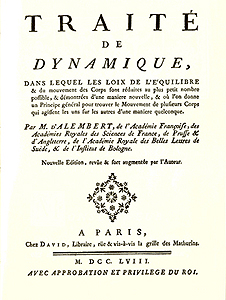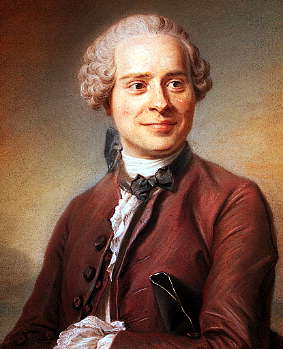Jean Le Rond d'Alembert
by Andrew Boyd
Today, the controversies of an enlightened mathematician. The University of Houston's College of Engineering presents this series about the machines that make our civilization run, and the people whose ingenuity created them.
Most problems have no clear right or wrong. Is mayonnaise better than mustard? Should governments address recessions with vast stimulus packages?
But mathematicians live in a unique world of absolute right and absolute wrong. Even scientific theories can get thrown out. Not true of mathematical results. Once true, always true. Nor can mathematicians disagree. True for one, true for all. So when a celebrated mathematician doesn't let the math speak for itself, it's hard to ignore.
 Jean Le Rond d'Alembert was one of the eighteenth century's preeminent mathematicians. He was elected to the French Academy of Sciences at the age of only twenty-three. His important contributions include the d'Alembert formula, describing how strings vibrate, and the d'Alembert principle, a generalization of one of Newton's classical laws of motion.
Jean Le Rond d'Alembert was one of the eighteenth century's preeminent mathematicians. He was elected to the French Academy of Sciences at the age of only twenty-three. His important contributions include the d'Alembert formula, describing how strings vibrate, and the d'Alembert principle, a generalization of one of Newton's classical laws of motion.
D'Alembert began his career to the accolades of his contemporaries. But that would change. Part of the problem was d'Alembert's personality. He argued pugnaciously, and continually stirred up controversy. This was tolerated — even encouraged — in the Parisian salons of the Enlightenment. But it didn't sit well with d'Alembert's mathematical peers. D'Alembert didn't just write mathematical papers. He insisted on explaining why his work was better than what others had done before.
Further indignation at d'Alembert arose from his sloppiness. In mathematical terms, d'Alembert "lacked rigor." His ideas were often good, but other mathematicians were left to fil l in the gaps. Noted twentieth century mathematician and historian Clifford Truesdell was completely unsympathetic. "One searches [through d'Alembert's work] for [what] little solid matter [there is]," he wrote, "[just] as a sparrow pecks out a few nutritious seeds from a dungheap." Even worse, d'Alembert was often just plain wrong. In a series of letters, he and Euler argued about the logarithms of negative numbers. They don't exist, at least when we limit ourselves to real numbers. Yet d'Alembert vehemently argued they did. Euler finally threw up his hands in anger and frustration.
l in the gaps. Noted twentieth century mathematician and historian Clifford Truesdell was completely unsympathetic. "One searches [through d'Alembert's work] for [what] little solid matter [there is]," he wrote, "[just] as a sparrow pecks out a few nutritious seeds from a dungheap." Even worse, d'Alembert was often just plain wrong. In a series of letters, he and Euler argued about the logarithms of negative numbers. They don't exist, at least when we limit ourselves to real numbers. Yet d'Alembert vehemently argued they did. Euler finally threw up his hands in anger and frustration.
And in the Croix ou Pile, an article included in Diderot and d'Alembert's monumental Encyclopédie, d'Alembert famously, and wrongly, argues that every time a coin comes up tails, the chance of seeing heads on the next flip actually goes up. Casinos would quickly go out of business if they calculated odds using d'Alembert's logic.
So what are we to make of d'Alembert? His contributions to mathematics aren't in dispute. But the contempt of his peers isn't without warrant — d'Alembert left a paper trail of flawed thinking. Perhaps we're best to simply remember him for what he was, first and foremost — human.
I'm Andy Boyd at the University of Houston, where we're interested in the way inventive minds work.
For a related episode, see 122, Diderot's Encyclopedia.
This essay was inspired by a lecture of Dr. Dominic Klyve, Professor of Mathematics at Carthage College. Dr. Klyve is curator of the Euler Archive, an online compendium of original works by Leonard Euler. See http://www.math.dartmouth.edu/~euler for more information.
Leonard Euler Opera Omnia. Basel, Switzerland: Birkhäuser Basel, 1992. (A 29 volume collection of works by Euler.)
Thomas Hankins. Jean d'Alembert: Science and the Enlightenment. Cambridge: Oxford University Press, 1970.
Varadaraja V. Raman. 1985. "The d'Alembert-Euler rivalry." The Mathematical Intelligencer. 7(1), pp. 35-41.
The quotation by Truesdell appears in the Opera Omnia, volume 12, page cxvii. It is taken from Raman's article in the Mathematical Intelligencer.
Pictures are taken from the Wikimedia Commons web site: https://commons.wikimedia.org/wiki/Main_Page.